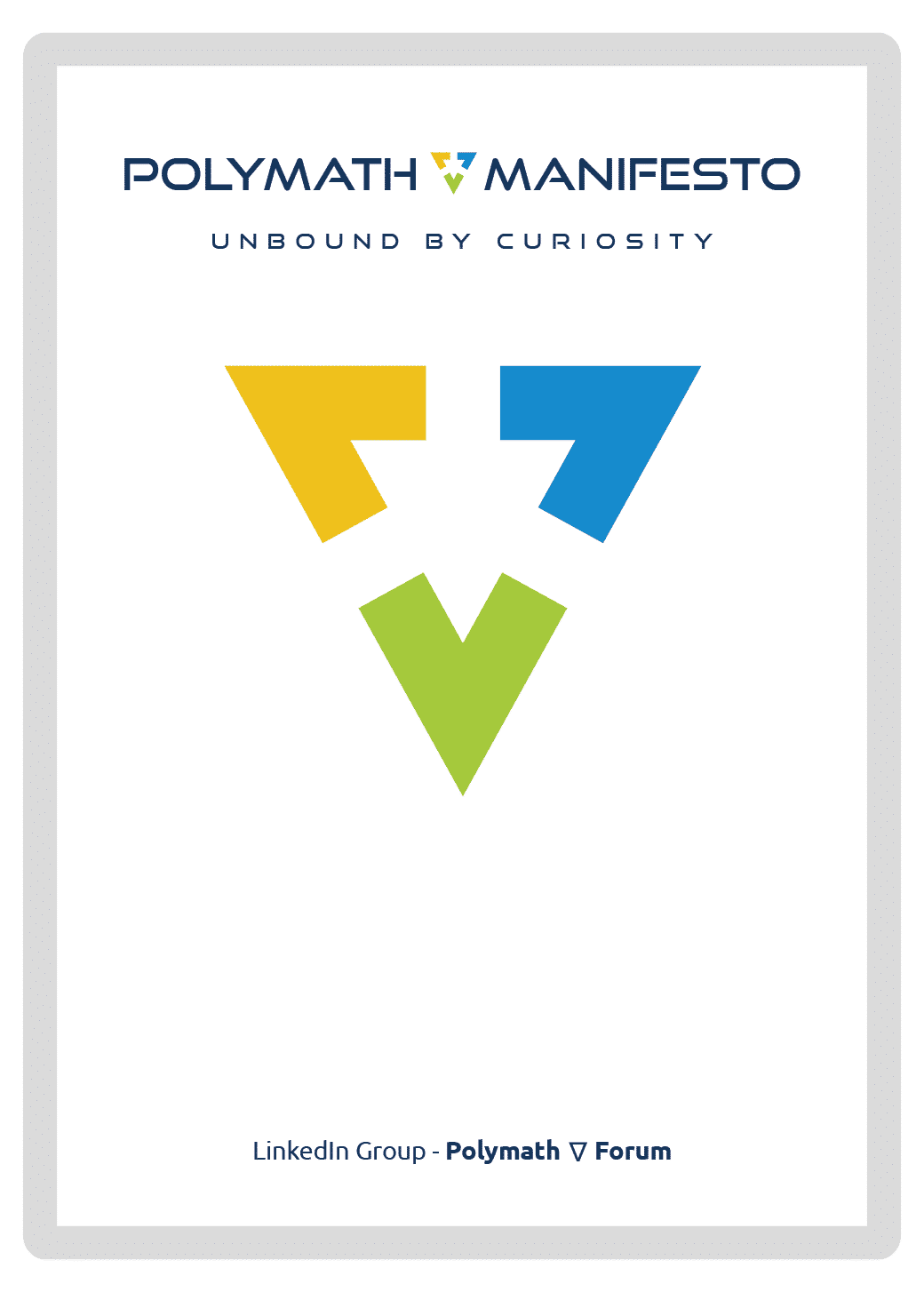The Polymath Forum LinkedIn group unites (aspiring) polymaths from around the globe. These individuals are distinguished by their profound expertise across multiple fields. Their multidisciplinary prowess fosters a comprehensive and nuanced approach to tackling intricate challenges.
Our aim is to bring together these bright minds, not just as a group of intelligent folks, but as an idea factory. Here, all kinds of expertise blend, creating a collaborative environment where we can take on the world’s most challenging puzzles. Together, we’re going to spark a revolution of innovation, breaking through old limits and sewing fresh ideas into the fabric of society. This isn’t just any team—it’s the start of a whole new movement ready to flip the script on how we solve problems and lead.

Polymath Manifesto
- Defining a Clear Vision: It crystallizes the collective’s aspirations, making the goal of systemic innovation and transformation explicit and inspiring.
- Fostering Unity and Identity: The Manifesto creates a sense of belonging and identity among members, uniting them under shared principles and a common purpose.
- Guiding Action and Decision-Making: It serves as a compass for the collective’s activities, ensuring that efforts are aligned with the overarching objectives and values.
- Attracting Like-Minded Individuals: By articulating a compelling vision, the Manifesto helps to attract and engage potential members who resonate with the collective’s goals.
- Promoting Collaboration: It emphasizes the importance of cross-disciplinary collaboration and collective problem-solving, encouraging members to leverage their diverse skills to pursue common objectives.
Polymath Roundtable: Preliminary Framework
To streamline and emphasize a proposed mode of operation for the Polymath Roundtable as a stepping-stone process, the focus shifts towards building internal capabilities and external credibility through structured initiatives. Here’s a more sequential breakdown:
Stage 1: Organizing Hackathons to Tackle Wicked Problems
- Objective: The initial step involves organizing hackathons to solve “wicked problems” to demonstrate the collective’s problem-solving prowess and establish internal and external confidence.
- Learning and Collaboration: These hackathons serve as a platform for members to refine their collaborative techniques, understand the dynamics of effective team assembly, and develop a clear set of operational rules.
- Visibility and Trust: These hackathons’ successes will be showcased to the broader world, proving the collective’s capability to address complex issues.
- Incentivization: Winning teams are rewarded with prize money funded through government subsidies, corporate sponsorships, and other means, fostering motivation and recognition of talent.
Stage 2: Engaging with Companies and Organizations
- Systemic Problem-Solving: Building on the credibility gained from hackathons, the collective offers services to solve systemic problems for individual companies or organizations.
- Selection Process: Different approaches to a client’s issue are explored using a hackathon format. Clients then select the most compelling solution, setting the stage for deeper engagement.
- Formation of Roundtable: The winning team(s) form a roundtable, expanding their circle by inviting additional experts necessary to craft the optimal solution for the client.
Stage 3: Implementation and Continuous Support
- Solution Presentation and Approval: The solution is presented to the client for approval.
- Vanguard Appointment: Upon acceptance, a polymath is appointed as a vanguard to co-lead the implementation process within the client’s organization.
- Roundtable Support: While the vanguard leads the project, they have continuous access to the roundtable’s collective expertise, ensuring adaptability and support throughout the implementation phase.
This structure allows the Polymath Roundtable to act as a beacon of interdisciplinary wisdom, offering profound insights and solutions to some of our time’s most pressing and complex challenges.
If you want to consider contributing, please join the Polymath Forum on Linkedin.
TEDx: Paths to Polymathy
We leave you with a TEDx talk that may lead you to rethink specialization. As Ben Vandgrift argued: we’re stuck in this idea of specialization. He argues: “Our society has misled us for a while. Specialization is great for insects. But as people, this is not our normal state. People aren’t, by nature, specialists. We are polymaths.”
Ben contends that polymaths are not merely driven to fix what’s broken. Instead, their boundless curiosity propels them towards a comprehensive understanding, which they leverage to transform things fundamentally.
Author
-
Edwin Korver is a polymath celebrated for his mastery of systems thinking and integral philosophy, particularly in intricate business transformations. His company, CROSS/SILO, embodies his unwavering belief in the interdependence of stakeholders and the pivotal role of value creation in fostering growth, complemented by the power of storytelling to convey that value. Edwin pioneered the RoundMap®, an all-encompassing business framework. He envisions a future where business harmonizes profit with compassion, common sense, and EQuitability, a vision he explores further in his forthcoming book, "Leading from the Whole."
View all posts Creator of RoundMap® | CEO, CROSS-SILO.COM






